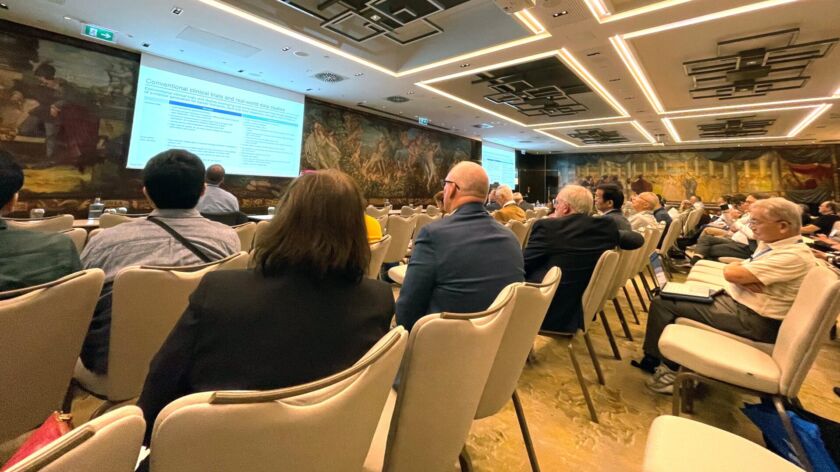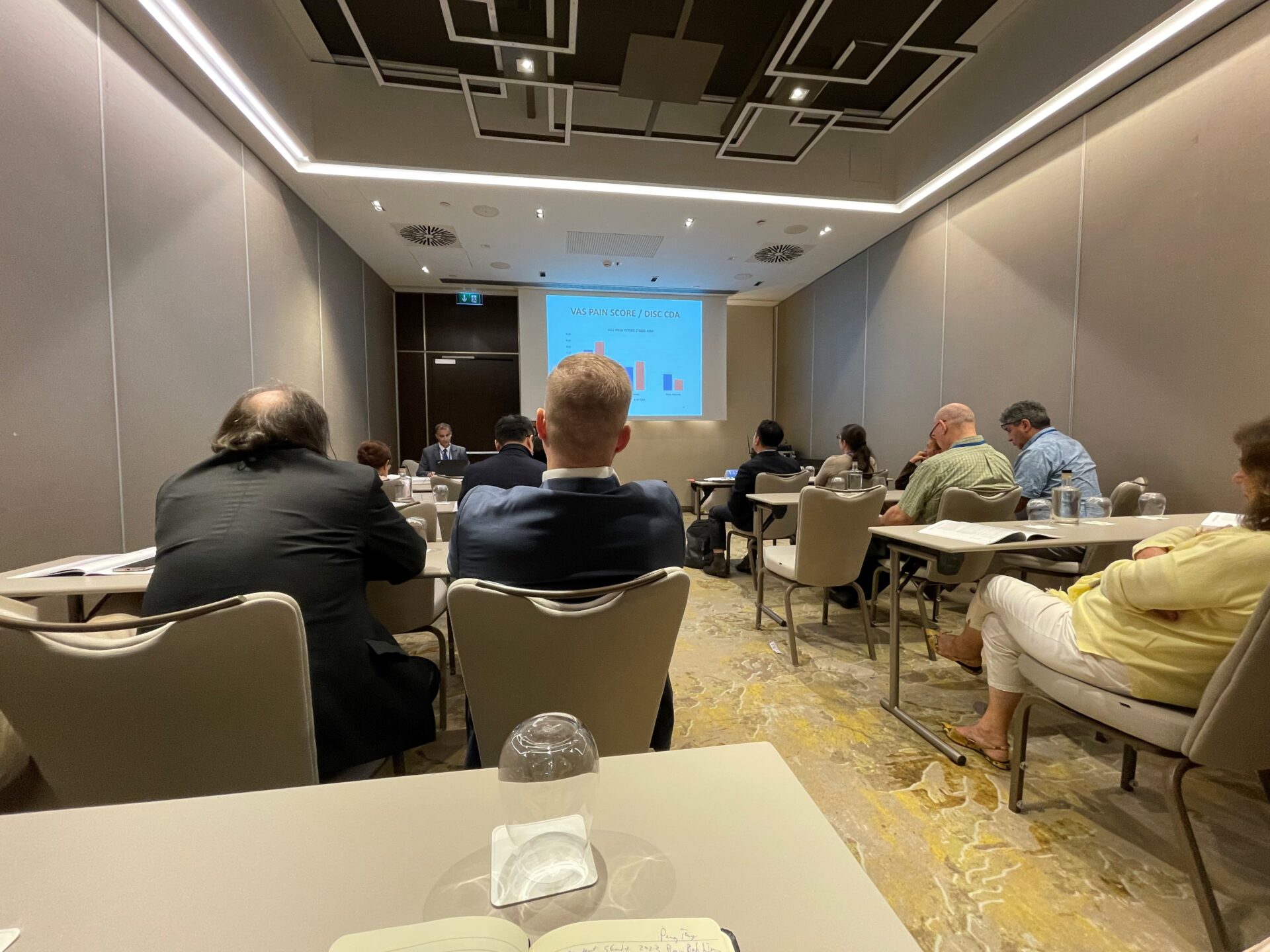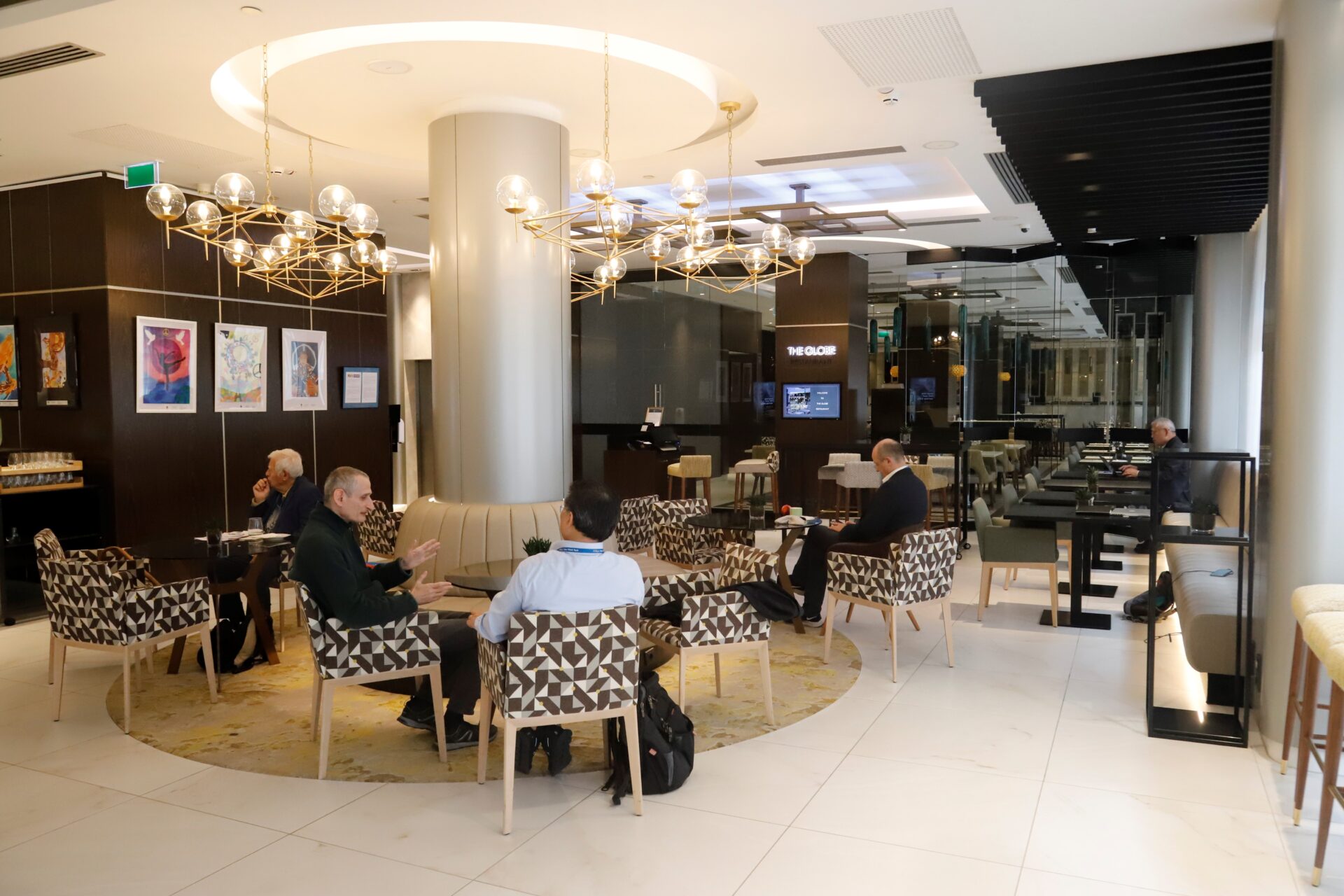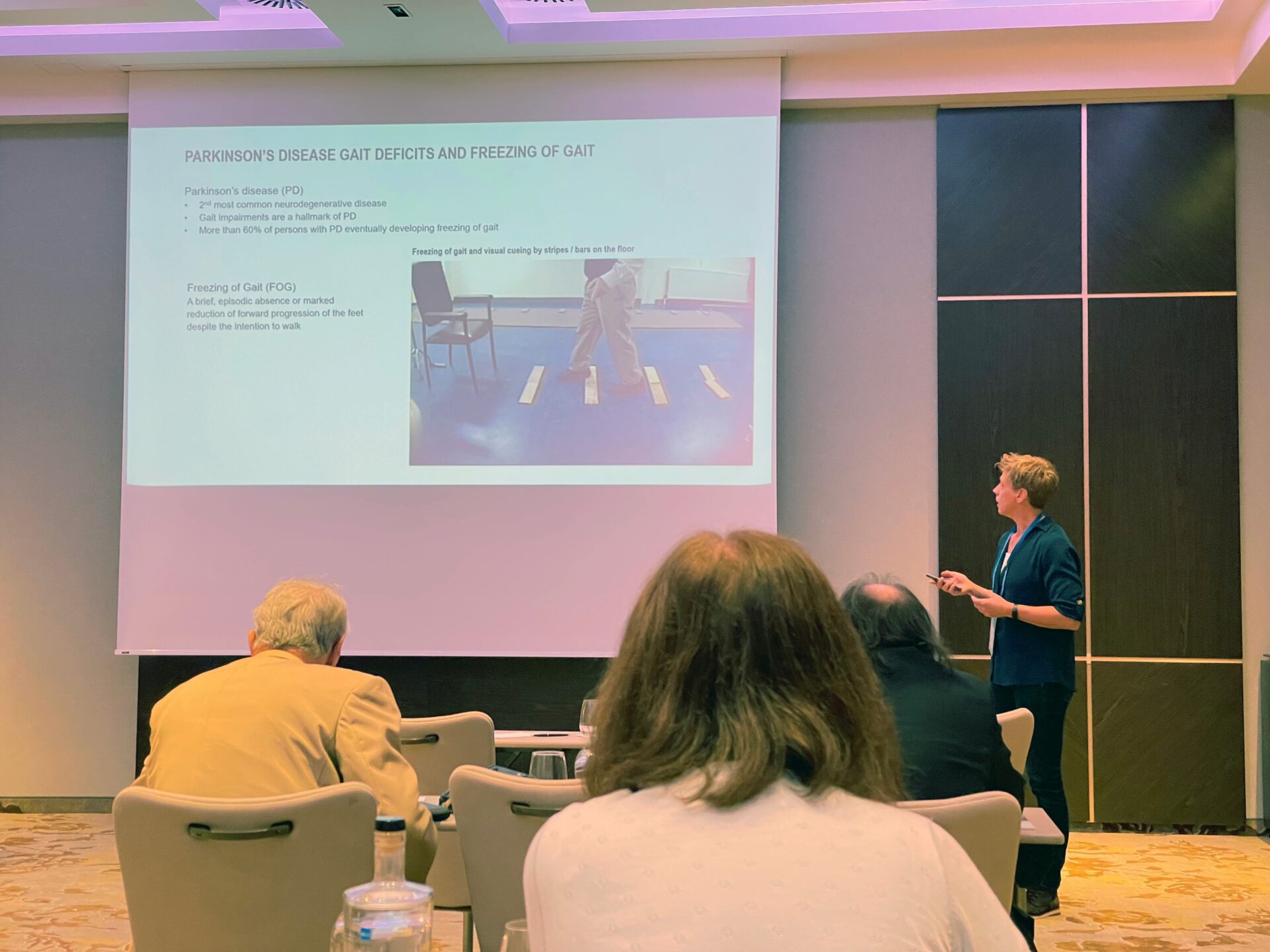Welcome to a fake scientific conference, the best way to extort money from scientists: ‘I feel cheated’
-
 Nepcongres. Foto: Stan van Pelt
Nepcongres. Foto: Stan van Pelt
Random topics and poor presentations: copycat conferences are the latest way rogue companies have found of extorting money from scientists. Vox attended one such conference in Budapest, where several Dutch researchers were giving a talk. ‘Once and never again!’
‘Well, at least you can later say that you attended a strange presentation about mobile phones in buses.’ Researcher Rand Raheem of Middlesex University (England) tries to joke away her discomfort as she concludes her talk. She just spent 20 minutes talking about the problems of unstable internet coverage in fast transport modes such as trains and buses, and what the technical solutions are for this.
In itself a perfectly normal topic for an academic conference, were it not for the fact that Raheem is speaking at a specialist conference on neuroscience, NeuroTalk Budapest. She is not the only oddball in the “Recent fundamental research in neuroscience” session. The next talk is about the role of osteoporosis in dental procedures. And even the presentations in this afternoon session that do touch on neuroscience are unrelated to each other. They range from the key role of interjections in understanding sentences to electrical stimulation of spinal nerves to promote intervertebral disc repair.
Predatory conference
That is a range of variation you don’t normally see at conference sessions, which tend to be precisely aligned in terms of content so that peers can meet to catch up and learn about their areas of expertise. In fact, conferences are of indispensable value for scientists as a place to network, spotlight their research, and get new research ideas.
So what is happening in Budapest? Neurotalk2024Europe – as the meeting is officially called – is what is known as a predatory conference. In Dutch, we would describe it as a ‘parasitic’ or ‘fake’ conference. A bit like buying fake Nikes without realising it. From a distance, these conferences look real, but on closer inspection they turn out to be a substandard quality copycat.
They are a kind of conference variant of the somewhat better-known predatory journals. These are scientific journals whose primary purpose is to function as a cash cow for the companies that publish them. Anyone who wants can publish in them, as long as they pay (hundreds to thousands of euros). However, there is no peer review, which means that the scientific value is zero. The publishers make money, while the scientists (intentionally or not) pimp up their CVs.
Fake conferences – which often involve the same companies (see box) – work in a similar fashion. Anyone can participate, as long as they pay the high registration fee. The result: an incoherent mishmash of content. As a result, a lot of public tax money is lost, and the organisers are the only ones who benefit. It is simply a new, but also to many scientists unknown, shoot on the academic fraud tree.
Shady company
Time to take a closer look at this particular form of money-grubbing. The NeuroTalk conference, held last June at a hotel in Budapest, provides an excellent opportunity to do so. Indeed, the programme features several Dutch scientists. What has brought them here, and are they aware of this newer form of academic malpractice? Press accreditation is not available, but by booking a hotel room at the conference hotel, reporting still proves to be fairly easy.
The organiser of the three-day meeting at the chic Radisson Blu Beke hotel is BITcongress. This somewhat shadowy company from China appears on lists of suspicious conference organisers. BIT is based in Dalian and claims to organise conferences in Europe, Japan, and China. Conference participants are recruited through flattering invitations, asking them to lecture on their ‘important’ research. Scientists soon receive dozens of such emails every month (even the reporter, himself a former scientist, received an email invitation to Budapest). The emails often praise the scientist’s ‘remarkable research’. Hence, these conferences are sometimes nicknamed vanity conferences. Most of the researchers who fall for it do not realise they are being misled.
Alexander Minnaert of the University of Groningen also responded to an email request, he tells us after the final morning session of NSS, in the Britannia II room of the Budapest conference hotel. In this session, the Professor of Pedagogy gave an inspired talk on how deaf-blind children can learn to communicate. ‘I was actually supposed to attend an earlier edition, in Singapore, but it was cancelled because of the pandemic. I couldn’t get my entry fee back, so I decided to attend after all, but in Budapest.’
‘Unfortunately, little was done about my suggestions to bring more coherence to the programme’
The fee in question – 1,650 to 3,050 dollar per person, according to the website – is simply paid by his university, says the professor. Minnaert is combining this conference with a visit to colleagues in the region with whom he is engaged in a research project.
The quality of many presentations is substandard, he admits. ‘Since I was supposed to chair a session, I made some suggestions to make it more coherent, but unfortunately little was done about it.’ Also, the talks are sometimes hard to follow. ‘They go in all directions. And the conference opening was of an abysmal level.’
Scam
Still, on the face of it, it is hard to call NeuroTalk a scam. After all, there are real scientists walking around, giving real talks, and attending of their own volition. Plus, the logistics and care on site are quite professional. Participants are being pampered with plentiful free lunches and drinks. Some regular small conferences are also not always strong in terms of content, as any researcher knows.
But if you look more closely and speak to attendees on site, it soon becomes clear that much is amiss. They are features that recur in other reports of fake conferences (most recently in the renowned Nature), in warnings in journals such as Science and also Nature, and on the websites of universities and companies producing conference software: What is it like to attend a predatory conference?.
‘What idiocy that they put me on the programme as a speaker’
Consider, for example, researchers who appear on the programme list without their knowledge, like anaesthesiologist-in-training Marije Wijnberge (Amsterdam UMC). ‘I am absolutely not a speaker,’ she emails indignantly, in response to a question about her scheduled attendance in Budapest. ‘I may have asked them for some extra information, but what idiocy that they put me on the programme as a speaker.’
That is not a mistake on the part of the organisers, but seems to be a deliberate strategy. Anyone who responds to the invitation in any way runs the risk of promptly seeing their own name on the preliminary programme, as bait for colleagues.
A second suspicious sign: the total absence on the conference website of summaries of the presentations scientists will be giving. At regular conferences, these are the tool of choice for deciding which talk to attend. Add to this the fact that the organisation is not in the hands of a trade union, but a vague Chinese company, and the fact that anyone who pays can attend, and you know something is amiss.
A final red flag is that organisations conveniently ‘combine’ conferences. Thus, in addition to NeuroTalk, there appear to be another eight conferences at the same time in the rooms of the Radisson Blue Beke hotel, all under the umbrella of BITcongress. These range from cardiology to dentistry and have bombastic names like Annual World Cancer Congress (where Wijnberge was scheduled) and Annual World Congress of Smart Materials.
None of the attendees interviewed report being aware of this. ‘I certainly didn’t know anything about it,’ says a puzzled US surgeon, Jenny Choi, who is attending the Annual World Congress of Digestive Disease (AWCDD). In total, there are about 400 visitors, according to the on-site organisers. This covers up the fact that some of these conferences do not amount to much: Choi’s AWCDD conference, for instance, only has two sessions.
No top performers
Nevertheless, Groningen Pedagogy expert Minnaert would not call the Budapest conference a scam, he says when asked. ‘Everyone is always saying that we need more cross-fertilisation between scientific disciplines. That is certainly the case here. I personally found the broadening into medicine interesting, and I made a few new contacts. After my presentation, someone asked if I was also coming to the afternoon session. He wanted to talk some more.’
His colleague Behrooz Alizadeh, epidemiologist at the University Medical Center Groningen (UMCG), is less impressed. ‘If the interdisciplinary character had been worked out professionally, it could have been really interesting, but that isn’t the case at all,’ he says in a sitting area on the first floor of the hotel. Like many other participants, the Groningen epidemiologist is not pleased with the scientific level. ‘Many of the speakers are not top performers in their fields, not even the keynote speakers. It’s mostly good for their own CV, which is dubious if you ask me.’
Why is he here? ‘I wanted to try it out.’ Incidentally, when asked the same question before the conference, he was somewhat defensive (‘it’s a legitimate conference,’ he emailed), but now that we are here, he is more open. ‘This is not a conference I would normally attend, but the organisers paid for my registration fee and hotel stay.’
A major reason for accepting the invitation was that he was initially scheduled to speak in the overarching keynote forum, which all 400 attendees could attend. But that plan ultimately fell through. ‘I am really annoyed about that; it was not what we agreed.’
In addition to the two Groningen scientists, there are a handful of Dutch researchers on the programme. Apart from Amsterdam-based Wijnberge (who is not attending), these include Parkinson’s Disease expert Ciska Heida from the University of Twente (UT). NeuroTalk’s broad programme appealed to her, she explains after her talk. ‘Better-known conferences tend to invite the usual suspects.’
Her professional-looking presentation, on recent research on how virtual reality and special vibrating socks help patients with Parkinson’s to walk better, is in stark contrast to the quality of many other talks. These are not really state-of-the-art, discussing scientific studies from five or more years ago.
That is not surprising, as the average age of the speakers is high; some are already retired. Like Roberto Avola, a 73-year-old Sicilian professor. His talk consists of him shuffling forward, sitting down at his laptop and reading the text of his slides verbatim, with a hard-to-understand Italian accent. ‘It is a bit of a retiree gathering,’ Heida noticed.
Ripped off
Not surprisingly, some participants feel downright ripped off, like Marisol Hernández, from the University of Chile. ‘I attended because I was invited and there were supposed to be interesting talks on leadership and health. But the topics are far too diverse. At other conferences, you make new connections, which can be really useful for your academic career. This conference is no use to me at all. I feel cheated.’
The visit cost her thousands of euros – an even greater expense for the less affluent Chilean than for many Western scientists.
Dutch scientists also appear to have been financially duped. ‘I just fell for it. Now I’ve lost 1,000 euro,’ says Niels, a postgraduate researcher at Utrecht University who does not wish his surname to be known. He had initially signed up for NeuroTalk because the website claimed that speakers from the industry would also be attending. This fitted perfectly with the shift he wanted to make from fundamental to more applied research. ‘I was hoping to speak to people who were already further along in this process.’ He was not familiar with the conference itself, but the fact that the programme included Groningen researchers gave him confidence.
He was pressurised to decide quickly to get a discount on the registration fee – another well-known tactic. ‘It was only after I had paid, more than 1,000 euro, that I looked up the conference organisers. That was when I found out that there were all kinds of warnings about them online.’ But at that point, it was already too late. ‘I wanted to cancel, but could only get part of my registration fee back.’
Niels will have to pay the lost 1,000 euros out his own pocket, as his department did not pay for his registration. ‘I feel really stupid, but I hope my experience is a warning to as many people as possible about this kind of scam.’
The local representatives of BITcongress, however, are not aware of any abuse. They are a handful of Chinese employees who are spending three days managing on-site logistics. Mr Liu is one of them. When asked, he confirms that scientists do indeed receive an invitation via email, and that anyone who subsequently responds positively and pays the registration fee is in principle allowed to come and speak. He explains this as if it all absolutely normal.
According to Liu, the conference is in line with his organisation’s objectives. ‘My boss is a doctor and entrepreneur and he started these conferences to help connect scientists and business professionals.’ It is hard to assess how much money BIT is getting out of it, but based on registration fees alone, the turnover must be close to a million euros. The hotel informs us that the fees they charge are confidential.
BITcongress is not amused when presented with criticism of these types of conferences via email. ‘Are you kidding?’, a certain Anna Li responds on behalf of the organisation. ‘We just incur high costs. We have been organising these conferences for 10 years, and we have invited nearly 100 Nobel laureates. Speakers are really happy with us.’
‘Once, and never again!’
None of the visitors we speak to plan to attend any of the upcoming editions – in Dublin and Stockholm, according to the programme booklet. ‘Once, and never again!’ says UT researcher Heida. ‘If I had known this beforehand, I wouldn’t have come.’ The same applies to Alizadeh from UMCG. ‘But it’s good to experience it once to know about it.’
For the conference organisers, all this probably makes little difference. The company have already got the loot. They can now use the group photos and names of the Budapest speakers to promote future editions. That way, the system continues to sustain itself and new speakers keep coming. After all, there are plenty of scientists in the world to approach.
The Vox reporter also soon gets another email, an invitation to speak at NeuroTalk Dublin. If you register straight away, you can get as much as 50% discount: 750 dollar. A proposal for a nonsense presentation, on the influence of aliens on human brain activity, is readily accepted. And the registration fee appears to be negotiable. ‘How much can you afford?’
More fake conferences than real ones
How extensive is this fake conference business? Hard figures are not easy to come by. British researcher Andy Nobes concluded a few years ago that there are probably more fake conferences than regular ones. For example, a major player like India’s OMICS, also notorious as a publisher of various fake journals, organises around three thousand conferences a year. Another well-known organiser is the World Academy of Science, Engineering and Technology (WASET).
In 2016, OMICS faced a lawsuit from the US Competition Authority, due to the misleading nature of its conferences and journals. A judge eventually sentenced the Indian company to a fine of more than 50 million euro. Incidentally, OMICS adamantly denied all accusations, filing a counterclaim of 3 billion euro.
This publication was made possible with the support of the VWN Trip Fund. An expanded version will appear next year in Te mooi om waar te zijn (Too Good To Be True) by Stan van Pelt, author of this article.






